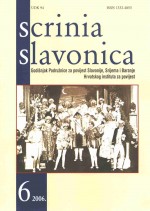Politički odnosi u Virovitici 1922.-1923.
The political stage in Virovitica between 1922 and 1923
Author(s): Ivica MiškulinSubject(s): History
Published by: Hrvatski institut za povijest
Keywords: Political life; municipal autonomy; Kingdom of the Serbs; Croats and Slovenes (the SHS Monarchy); Virovitica.
Summary/Abstract: On the basis of various publications produced by the parties and of available archival materials, the author of this paper sets out to analyze the development of the political scene in Virovitica from the beginning of 1922 to the end of 1923. Given the importance of the events that occurred and their impact on the future development of the political life in Virovitica, this period represents one of the most important episodes in the interwar history of Virovitica. The period was marked by the absence of the basic mechanisms of town government (nonfunctioning of town representation), by frequent interference of higher regional or state bodies with the political life of the town and by intense animosity among the local party leaders. In light of such circumstances Virovitica appeared to be an area of political instability, which had adverse effects on the economic development of the whole region. In the period between the establishment of the Monarchy of the Serbs, Croats and Slovenes (the SHS Monarchy) and 1923, the political scene was remarkable for the lack of continuity in the functioning of town authorities. In result of various political actions undertaken by different political parties and bodies of authority, it was impossible to elect a mayor of Virovitica all through December 1923. Until the passing of the State Protection Act and the “Obznana” decree, this was prevented by the communists refusing to pledge an oath, which was obligatory at the time for all bodies of authority (representatives of municipal and town authorities and those in the Parliament) under the Constitution of the SHS Monarchy. Even after communist activities had lost some of the popularity and luster in the political life of Virovitica, the mayor could still not be elected for reasons of interference on the side of Croatian Popular Peasant Party (HPSS) / Croatian Republican Peasant Party (HRSS), which had been the most influential party since the elections for the Constituent Assembly. This had multiple effects. On the one hand, the HPSS/HRSS took over quite a big portion of the electoral votes from the Croatian Union (HZ), preventing thus members of the latter (who were ready to pledge political oaths and to participate in the functioning of the town authorities) to gain the majority of votes and to elect a mayor from their own rank. On the other hand, such behavior of HPSS/HRSS only gave boost to the town radicals. Once the members of the HZ eventually succeeded (largely due to the abstinence of HPSS/HRSS) in winning the majority of seats in representative bodies of the town of Virovitica, other factors stood in the way of electing a mayor. Because several representatives of HZ joined with the radical camp and due to the support from the higher bodies of authority, the National Radical Party (NRS) organization in Virovitica (which also enjoyed the support of the democrats) managed to prevent it again. The Virovitica case, in essenc
Journal: Scrinia Slavonica
- Issue Year: 2006
- Issue No: 6
- Page Range: 305-341
- Page Count: 37
- Language: Croatian

